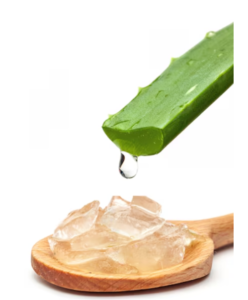Introduction
Aloe Vera has long been celebrated for its impressive array of health benefits. Known for its soothing and healing properties, Aloe Vera is often associated with skin care, but the benefits extend well beyond that. This powerful plant contains essential nutrients that support health, providing anti-inflammatory, immune-boosting, and digestive health benefits that are well-supported by science.
Table of Contents
What is Aloe Vera?
Vitamins, minerals, enzymes, and amino acids are abundant in the leaves of aloe vera, a succulent plant that produces a clear, gel-like substance in its leaves. The inner gel has been used traditionally in various medicinal applications, showing effectiveness in soothing burns, aiding digestion, and promoting overall wellness.
History of Aloe Vera
A long history of using Aloe Vera can be traced back thousands of years. It was included in burial rituals and referred to as the “plant of immortality” by the ancient Egyptians. Various cultures across the globe, from the Greeks to the Chinese, have used Aloe Vera for its medicinal properties.
Nutritional Profile of Aloe Vera
Aloe Vera is packed with nutrients essential for health. It contains vitamins A, C, and E, which act as antioxidants, as well as vitamin B12, folic acid, and choline. Minerals like calcium, chromium, copper, selenium, magnesium, potassium, sodium, and zinc support a range of bodily functions, and Aloe also contains eight essential amino acids.
Aloe Vera for Skin Health
Aloe Vera is renowned for its skin benefits. It’s often used in moisturizers and healing creams due to its high water content and ability to penetrate the skin quickly, providing hydration and relief from dry or irritated skin. Studies show Aloe Vera’s effectiveness in reducing the healing time for burns.
Anti-Inflammatory Benefits of Aloe Vera

Inflammatory symptoms can be reduced by aloe vera compounds such as acemannan. This can be beneficial for conditions like arthritis or injuries where inflammation causes discomfort. Some studies suggest that Aloe’s anti-inflammatory properties may even be useful for treating inflammatory skin conditions.
Aloe Vera’s Antioxidant Properties
Cells can be damaged by free radicals, resulting in aging and various diseases. Aloe Vera contains antioxidants, which help neutralize these free radicals. The antioxidants in Aloe Vera, such as vitamins A, C, and E, play a role in protecting the body from oxidative stress.
Aloe Vera for Digestive Health
One of the most popular uses of Aloe Vera is for digestive support. Aloe Vera’s natural enzymes help improve digestion, and it can provide relief from conditions like irritable bowel syndrome (IBS) or acid reflux. Studies indicate that Aloe Vera may help to cleanse and detoxify the digestive system.
Immune-Boosting Effects of Aloe Vera

Aloe Vera’s polysaccharides play a significant role in immune function by stimulating white blood cells to fight infection. Some research suggests that these compounds might improve the body’s response to stress, making Aloe Vera a valuable addition to an immune-boosting regimen.
Aloe Vera’s Impact on Heart Health
Aloe Vera can also benefit heart health. Research has shown it can help reduce levels of cholesterol and improve blood circulation. Aloe Vera’s anti-inflammatory properties may reduce the risk of heart disease by alleviating inflammation in the arteries.
Aloe Vera as a Natural Laxative
The latex found in Aloe Vera is a well-known natural laxative, making it useful for treating constipation. However, it should be used cautiously, as excessive use can lead to dependency or other digestive issues.
Aloe Vera for Oral Health
The antibacterial properties of aloe vera make it an excellent oral care agent. Aloe Vera mouthwash has been shown to reduce plaque buildup and soothe gum inflammation. It may also help with healing mouth ulcers.
Using Aloe Vera for Hair and Scalp Health
Aloe Vera’s moisturizing properties extend to hair and scalp health. It can help reduce dandruff, soothe an itchy scalp, and improve the overall health and strength of hair, leaving it shiny and resilient.
Aloe Vera’s Role in Blood Sugar Regulation
Studies suggest that Aloe Vera may help regulate blood sugar levels, potentially benefiting those with diabetes. Aloe contains compounds that may improve insulin sensitivity, making it a promising natural supplement for managing blood glucose.
Potential Risks and Precautions

There are many benefits to Aloe Vera, but the right way to use it is essential. Consuming high doses of Aloe Vera latex can lead to adverse effects like kidney issues. It’s best to consult a healthcare provider before using Aloe Vera supplements or incorporating it into your routine, especially if you have pre-existing health conditions.
How to Incorporate Aloe Vera into Your Daily Routine
Aloe Vera has many benefits that can be enjoyed in numerous ways. You can drink Aloe Vera juice, apply it topically as a moisturizer, or use it in your hair care routine. Adding Aloe Vera gel to smoothies is another easy way to incorporate it into your diet.
FAQs
A, C, and E vitamins are found in Aloe Vera, along with calcium, magnesium, and zinc minerals.
Besides hydrating the skin, it also helps heal wounds and reduce inflammation.
Yes, Aloe Vera contains enzymes that aid digestion and relieve issues like acid reflux.
Aloe Vera is safe in moderation; excessive consumption of Aloe latex should be avoided.
Aloe Vera can strengthen hair and reduce dandruff, contributing to healthier hair growth.
Its polysaccharides stimulate white blood cells, which boosts immune function.
Studies indicate that Aloe Vera can improve insulin sensitivity, beneficial for blood sugar regulation.
It is true that Aloe Vera soothes inflammation in the gums and reduces plaque.
High doses of Aloe latex can cause digestive issues, and it may interact with certain medications.
Research shows Aloe Vera may help reduce cholesterol, improving heart health.

10 Proven Benefits of Bananas for Health and Well-being
Bananas are known for their natural sweetness, ease of peeling and rich nutrition. This makes them one of the most commonly consumed fruits in the world. Though bananas originated in Southeast Asia, they are now

Disease X: The Next Pandemic?
Emerging infectious diseases pose one of the greatest threats to human health and global stability. One of them, “Disease X” has intrigued scientists and WHO, as it represents the potential for an unknown disease to

The Remarkable Benefits of Eating Acorn Squash in Winter
Acorn squash has all the qualities that make it special. Winter calls for warmth, comfort, and nutrition, and acorn squash provides all of these. This vegetable is not just delicious but also has a lot

Omega-3 Fatty Acids
Omega-3 fatty acids play a very important role in the nutrients needed to maintain overall health. As people are getting to know about it, its popularity is increasing day-by-day. These fats play a very important



